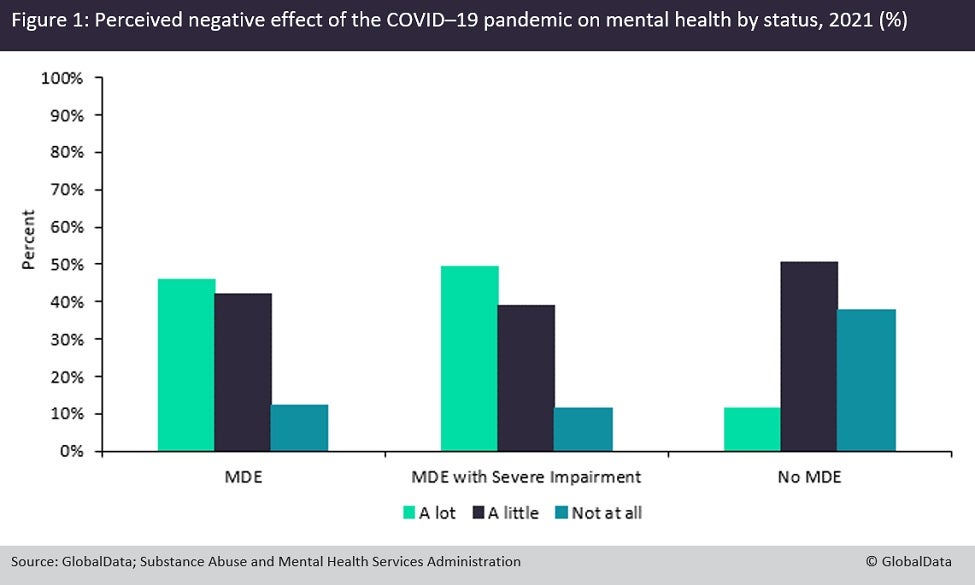The COVID-19 pandemic has been ongoing since March 2020, resulting in 609,195,806 confirmed cases and 6,592,280 deaths in the US to date. The effects of this pandemic have been wide-reaching, including supply chain issues, financial distress, and public health discourse. Increased attention is being paid to the effects that the COVID-19 pandemic has had not only on physical health, but on mental health as well. The Substance Abuse and Mental Health Services Administration (SAMHSA) recently published a report on the 2021 National Survey of Drug Use and Health (NSDUH), which included a chapter dedicated to the perceived impacts of the pandemic on mental health and substance use in the US.
The 250,000 respondents of the NSDUH ages 18 years and older were asked about the perceived negative effect of the COVID-19 pandemic on their emotional and mental health. The respondents were separated by depression status: people who experienced a major depressive episode (MDE) in the prior year, people who experienced an MDE with severe impairment, and people who did not experience an MDE. Response options regarding impact severity were “Not at all”, “A little or some”, and “Quite a bit or a lot”.
The distribution of the pandemic’s perceived negative effect on mental health differed between pre-MDE and non-MDE groups (Figure 1). Of respondents with prior-year MDE, 12% were not impacted by the pandemic, 42% were impacted “a little”, and 46% were impacted “a lot”. Similarly, 12% of respondents with prior MDE and severe impairment reported no impact, 39% reported “some” impact, and 49% reported a “quite a bit” of impact. In contrast, respondents with no prior MDE were impacted less severely and less often than prior-MDE cohorts. In this group, 38% of people experienced no negative impact, 50% sustained “some” impact, and 12% felt that the pandemic had “a lot” of negative impact on their mental health.
Part of why mental health impairment is more dramatic among the previously afflicted may be due to reduced access to mental healthcare during the pandemic. When asked about the impact of the pandemic on their access to mental healthcare, 41% of respondents experienced appointments moved from in-person to telehealth, 36% encountered delayed or cancelled appointments, 14% suffered delays in prescriptions, and 9% responded that inability to access care resulted in a moderate to severe impact on their mental health.
In the Diagnostic and Statistical Manual of Mental Disorders, Fifth Edition (DSM-5), a major depressive disorder (MDD) diagnosis requires an MDE, which is at least five symptoms of depression experienced every day for at least two weeks. These symptoms include but are not limited to depressed mood, fatigue, loss of interest or pleasure, sleep disturbance, sense of worthlessness, and suicidal ideation. MDD can go undiagnosed, and these symptoms qualify an individual for MDD regardless of severity. GlobalData epidemiologists forecast that there were 7.6 million diagnosed prevalent cases of MDD in the US in 2021. However, there are many undiagnosed cases of MDD, so this figure may be even greater in light of the 2021 NSDUH report.


US Tariffs are shifting - will you react or anticipate?
Don’t let policy changes catch you off guard. Stay proactive with real-time data and expert analysis.
By GlobalData




